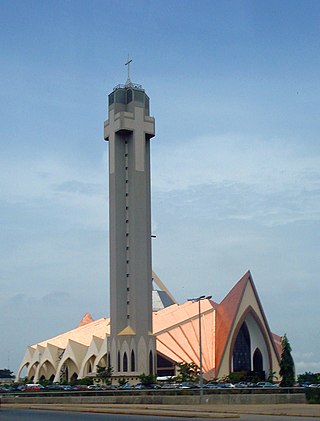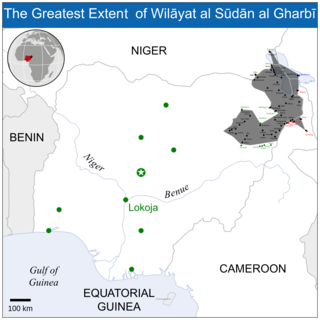
The Deobandi movement or Deobandism is a revivalist movement within Sunni Islam that adheres to the Hanafi school of law. It formed in the late 19th century around the Darul Uloom Madrassa in Deoband, India, from which the name derives, by Muhammad Qasim Nanautavi, Rashid Ahmad Gangohi, and several others, after the Indian Rebellion of 1857–58. The movement pioneered education in religious sciences through the Dars-i-Nizami associated with the Lucknow-based ulema of Firangi Mahal with the goal of preserving traditional Islamic teachings from the influx of modernist, secular ideas during British colonial rule. The Deobandi movement's Indian clerical wing, Jamiat Ulema-e-Hind, was founded in 1919 and played a major role in the Indian independence movement through its participation in the Pan-Islamist Khalifat movement and propagation of the doctrine of composite nationalism.

Minna is a city in Middle Belt Nigeria. It is the capital city of Niger State, one of Nigeria's 36 federal states. It consists of two major ethnic groups: the Gbagyi and the Nupe.
Asari-Dokubo, formerly Melford Dokubo Goodhead Jr. and typically referred to simply as Asari, is a major political figure of the Ijaw ethnic group in the Niger Delta region of Nigeria. He was president of the Ijaw Youth Council for a time beginning in 2001 and later founded the Niger Delta People's Volunteer Force which would become one of the most prominent armed groups operating in the Niger Delta region. He is a Muslim with populist views and an anti-government stance that have made him a folk hero amongst certain members of the local population.

Religion in Nigeria is diverse. The country is home to some of the world's largest Christian and Muslim populations, simultaneously. Nigeria is divided roughly in half between Muslims, who live mostly in the north, and Christians, who live mostly in the south; indigenous religions, such as those native to the Igbo and Yoruba ethnicities, are in the minority. The Christian share of Nigeria's population is on the decline due to higher fertility rate of Muslims in the country.

Islam in Niger accounts for the vast majority of the nation's religious adherents. The faith is practiced by more than 99.3% of the population, although this figure varies by source and percentage of the population who are classified as Animist. The vast majority of Muslims in Niger are Malikite Sunni with Salafi influences. Many of the communities who continue to practice elements of traditional religions do so within a framework of syncretic Islamic belief, making agreed statistics difficult. Islam in Niger, although dating back more than a millennium, gained dominance over traditional religions only in the 19th and early 20th centuries, and has been marked by influences from neighboring societies. Sufi brotherhoods have become the dominant Muslim organization, like much of West Africa. Despite this, a variety of interpretations of Islam coexist—largely in peace—with one another as well as with minorities of other faiths. The government of Niger is secular in law while recognising the importance of Islam to the vast majority of its citizens.

Mohammed Yusuf, also known as Ustaz Mohammed Yusuf, was a Nigerian terrorist who founded the Islamist militant group Boko Haram in 2002. He was its leader until he was killed during the 2009 Boko Haram uprising. The group's official name is Jama'atu Ahlis Sunna Lidda'awati wal-Jihad, which in Arabic means "People Committed to the Propagation of the Teachings and Jihad".

Nigerians or the Nigerian people are citizens of Nigeria or people with ancestry from Nigeria. The name Nigeria was taken from the Niger River running through the country. This name was allegedly coined in the late 19th century by British journalist Flora Shaw, who later married Baron Frederick Lugard, a British colonial administrator. Nigeria is composed of various ethnic groups and cultures and the term Nigerian refers to a citizenship-based civic nationality. Nigerians derive from over 250 ethno-linguistic groups. Though there are multiple ethnic groups in Nigeria, economic factors result in significant mobility of Nigerians of multiple ethnic and religious backgrounds to reside in territories in Nigeria that are outside their ethnic or religious background, resulting in the mixing of the various ethnic and religious groups, especially in Nigeria's cities. The English language is the lingua franca of Nigerians. Nigeria is divided roughly in half between Muslims, who live mostly in the north, and Christians, who live mostly in the south; indigenous religions, such as those native to the Igbo and Yoruba ethnicities, are in the minority.
The population of Shias in Africa is composed of several communities:

In Nigeria, Sharia has been instituted as a main body of civil and criminal law in twelve Muslim-majority states since 1999, when then-Zamfara State governor Ahmad Sani Yerima began the push for the institution of Sharia at the state level of government. A "declaration of full Sharia law" was made in the twelve states in that year, and the states created Islamic legal institutions such as a Sharia Commission, and Zakat Commission, and a hisbah, i.e. "a group expected to promote Islamic virtue, whilst discouraging vice". According to some critics, the adoption of Sharia law violates Article 10 of the Nigerian constitution guaranteeing religious freedom.
Conversion to Islam in U.S. prisons refers to the contemporary high rate of conversion to Islam in American prisons, for which there are a number of factors. It is the fastest growing religion in U.S. prisons, where the population is 18 percent Muslim ; 80 percent of all prison religious conversions are to Islam.

The 2009 Boko Haram uprising was a conflict between Boko Haram, a militant Islamist group, and Nigerian security forces.

Boko Haram, officially known as Jamā'at Ahl as-Sunnah lid-Da'wah wa'l-Jihād, is an Islamist militant organization based in northeastern Nigeria, which is also active in Chad, Niger, northern Cameroon, and Mali. Boko Haram was the world's deadliest terror group during part of the mid-2010s according to the Global Terrorism Index. In 2016, the group split, resulting in the emergence of a hostile faction known as the Islamic State's West Africa Province.

The Jebba Hydroelectric Power Station, also Jebba Power Station, is a hydroelectric power plant across the Niger River in Nigeria. It has a power generating capacity of 578.4 megawatts, enough to power over 364,000 homes. The plant was commissioned on 13 April 1985, although commercial energy production began in 1983.
Islamic religious police are official Islamic vice squad police agencies, often in Islamic countries, which enforce religious observance and public morality on behalf of national or regional authorities based on its interpretation of sharia. Modern Islamic religious police forces were first established in the late-1970s amidst the Iranian Revolution and the Islamic revival the revolution brought; prior, the administration of public morality in most Islamic countries was considered a socioreligious matter, and was enforced through application of civil laws or through more informal means.

The Boko Haram insurgency began in July 2009, when the militant Islamist and jihadist rebel group Boko Haram started an armed rebellion against the government of Nigeria. The conflict is taking place within the context of long-standing issues of religious violence between Nigeria's Muslim and Christian communities, and the insurgents' ultimate aim is to establish an Islamic state in the region.

Shershabadia, is a Bengali Muslim community found in the state of West Bengal, Bihar and Jharkhand in India. They belong to Shaikh community and also form a significant part of the Shaikhs of West Bengal and Bihar. Common surnames used by the community include Shekh, Sekh, Haque, Islam, Mondal. Most of them are Sunni Muslims who associate with the Ahl-i Hadith movement.

Kala Kato is a Quranist movement whose adherents reside mostly in northern Nigeria, with some adherents residing in Niger. Kala Kato means a "man says" in the Hausa language, in reference to the sayings, or hadiths, posthumously attributed to the Islamic prophet Muhammad. Kala Kato accepts only the Quran as authoritative and believe that anything that is not Kala Allah, which means what "God says" in the Hausa language, is Kala Kato.

As of 2012, the city of Houston has the largest Muslim population in Texas and the largest Muslim population in the Southern United States. That year, Kate Shellnut of the Houston Chronicle wrote that "Some estimate that Muslims make up 1.2 percent of the city's population." As of 2012 the estimated population of Muslims in Houston was around 63,000. As of today, there are over 209 mosques and storefront religious centers, with the largest being the Al-Noor Mosque of the Islamic Society of Greater Houston (ISGH).

Starting in late January 2015, a coalition of West African troops launched an offensive against the Boko Haram insurgents in Nigeria.
The status of religious freedom in Africa varies from country to country. States can differ based on whether or not they guarantee equal treatment under law for followers of different religions, whether they establish a state religion, the extent to which religious organizations operating within the country are policed, and the extent to which religious law is used as a basis for the country's legal code.














